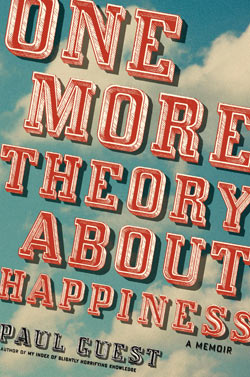
One More Theory About Happiness | Paul Guest | ECCO | 208 PAGES | $21.99 |
When he was a fireworks-loving 12-year-old, Paul Guest rolled down a steep driveway on a bike with a broken brake cable. He steered onto the grass in an attempt to slow his momentum, the bike fell into a weed-concealed ditch, and Guest took flight. He landed with a third- and fourth-vertebrae-crushing, quadriplegia-inducing thud. In his new memoir,
One More Theory About Happiness, Guest — a Whiting Award-winning poet — details the trials of that post-thud life: his recovery, transition into adulthood and independence, and his emergence as a writer.
Here, as in his poetry, Guest offers his experiences with unblinking honesty — like the time his urine leaks out of its bag and onto his lap minutes before he is scheduled to give a poetry reading. He finds his supportive mother in the lobby and takes it in stride. “ ‘Good news,’ I said. I nodded down towards the spreading wetness.” She buys him a pair of jeans, cleans him up, and he reads his poems. Guest doesn’t tout himself as a hero. But in graceful moments like this you can’t help but feel awed by his resiliency. Embarrassment and humiliation don’t stop him. He deals with each challenge and moves on.
His quadriplegia also places him at a unique vantage to witness the bizarre behavior of others. The obviousness of his handicap causes people to open up to him, and he often has to deal with those moments when “a stranger’s grief appears ready to ignite.” One of the more touching, awkward moments comes when his adult middle-school assistant — a married woman named Jennifer — is overcome: “I have developed feelings for you. Serious feelings.” Seeking guidance from her pastor, she resigns. What comes through here also is Guest’s own resentments and anger at being responsible for the emotions of those charged with his care — having to “tamp down their sense of my suffering.”
The uniqueness of Guest’s situation almost guarantees that though the settings — suburbia, a university —are commonplace, his story is never boring. His humor also makes a difference, and the book is often very funny. After moving to Illinois to begin his MFA at Southern Illinois University, he must find an assistant with the requisite medical and emotional skills. He discovers a Romanian immigrant named Lazar Tonu “Tony” whose brusqueness comes as a relief: “I know how to remove your urine and poop and none of this bothers me.” Their relationship produces some of the book’s more entertaining moments. Over and over, where Guest could see the degrading, he sees the ridiculous.
Those continued indignities and inconveniences also reveal new depths of insight. Guest writes, “To depend on someone else for everything you cannot do for yourself, no matter how private, is to cultivate a forced intimacy.” His forced intimacy with characters as disparate as Jennifer and Tony provide Guest with a story worth sharing. He doesn’t overcome his permanent disability, but he does find fulfillment in what he’s given. That’s a good take-away from any memoir — no matter how physically able you are.